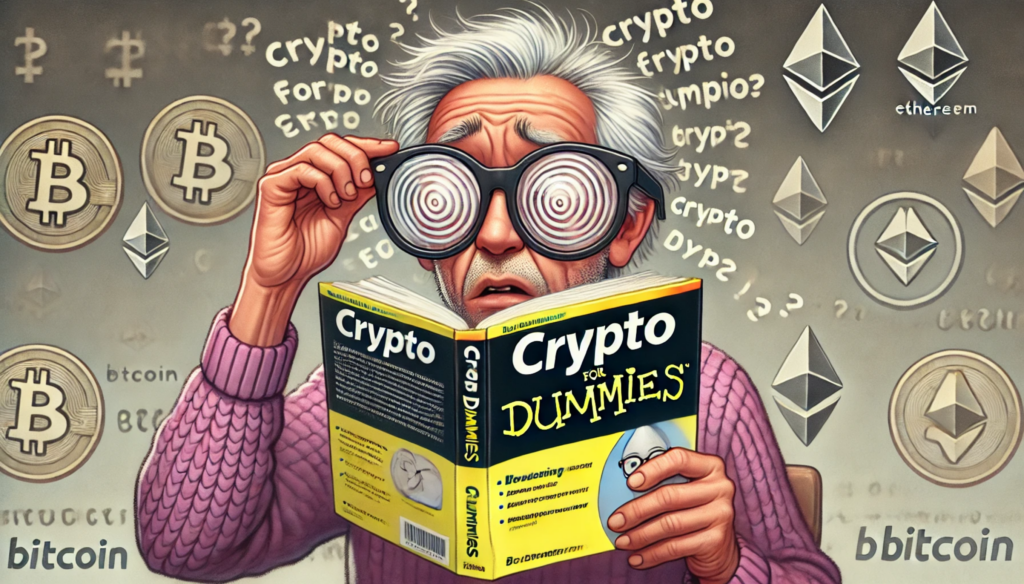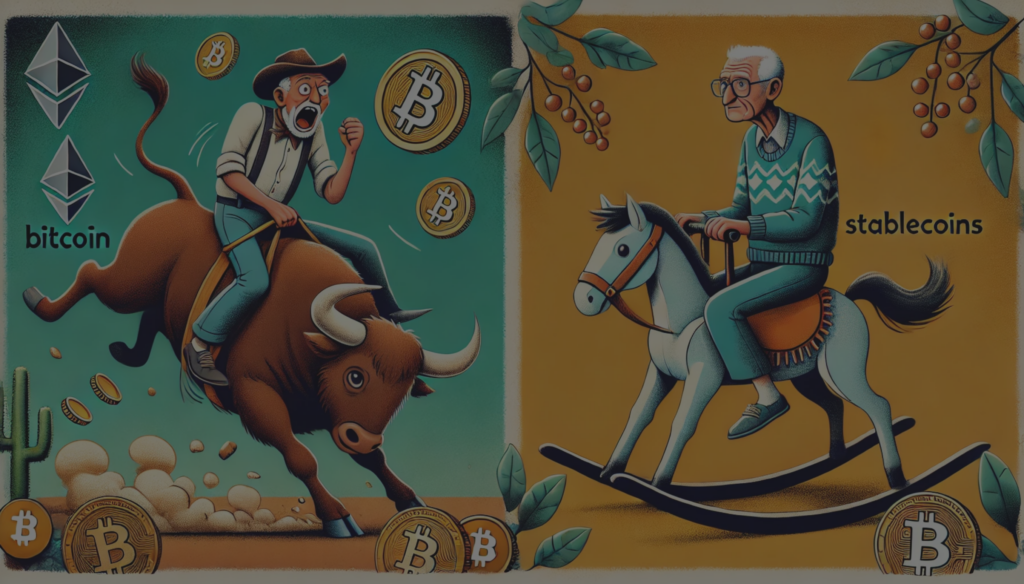
Newsletter Subscribe
Enter your email address below and subscribe to our newsletter

If you’ve ever tried to wrap your head around cryptocurrency (aka crypto) and felt like you were reading a legal document… written in a foreign language… while wearing foggy reading glasses? If so, you’re not alone!

The world of cryptocurrency is confusing, exciting, and—let’s be honest—a little scary.
But is crypto something seniors should care about, or is it just another tech trend best left to 20-year-olds in hoodies?
In this article, we won’t be giving investment advice (no get-rich-quick schemes here!), but we will break down what cryptocurrency actually is, the pros and cons, and some smart ways to approach it if you want to dip your toes in the crypto waters.
And we’ll do it in a way so you won’t feel like you need a Ph.D. in blockchainBlockchain is a type of digital record-keeping system that stores information securely across many c... More to understand it! (And, yes, I’ll explain what blockchain is in a minute!)
Ready? Let’s dive in!
I’ve been dabbling in crypto since 2018. I didn’t get into it because I had a crystal ball (if I did, I’d be writing this from my private island) but because a few things about it intrigued me.
Sure, the idea of seeing my investment soar was appealing—who doesn’t like the thought of turning a little into a lot? But that wasn’t the only thing that pulled me in.
What really caught my attention was the idea of having complete control over my own money—without relying on banks, government policies, or third parties deciding what I could or couldn’t do with it.
The idea of financial independence, where I truly owned my assets, felt like a big deal.
And then there was diversification. I’ve always believed in not putting all my eggs in one basket, and crypto seemed like an interesting way to diversify my overall investment strategy.
So, how has my experience been?
Well, some of it’s been great! Over the years, I’ve mainly invested in BitcoinBitcoin is a decentralized digital currency that operates on a peer-to-peer network without the need... More and Ethereum, the two biggest players in the space. And in that time, their value has skyrocketed.
Bitcoin’s price is up around 10 times since 2018, while Ethereum is up around 5 times. Sadly, I didn’t buy enough of either to quit my day job 😉
But I’ve also made some, let’s say, less-than-wise decisions. For example, I once invested in a cryptocurrency called DRIP because a buddy told me it would magically multiply my money.
And it did… the amount of DRIP I owned compounded at 1% per day! Over just a few months, the number of DRIP coins in my account went up quite a bit.
The problem? The price went from $150 per token to about $0.0025. Ouch!
Then there was FTX, one of the biggest crypto exchanges, which I had an account on—right up until it collapsed in spectacular fashion.
(Quick but important side note:
Think of a crypto exchange like an online currency exchange at the airport. If you’re traveling to another country, you swap your dollars for euros or yen. A crypto exchange works the same way—you trade your regular money for digital money like Bitcoin or Ethereum.
But here’s where it’s different: Many exchanges don’t just let you buy crypto—they also hold it for you in an online account, kind of like a bank.
The catch? Unlike a bank, if the exchange gets hacked or goes out of business (like FTX did), you could lose your funds (like I did).
Yeah, so some Bitcoin and Ethereum I was holding at FTX disappeared into the void. Bummer 😔
Through good and bad, I’ve learned a lot about crypto along the way and can share some of these lessons with you here.
That way, you can decide whether you think crypto is worth looking into further… or if it’s just digital funny money with a side of heartbreak.

Okay, let’s start with the big question: What exactly is cryptocurrency?
At its core, cryptocurrency is digital money. But unlike the dollars in your wallet or even the ones sitting in your bank account, crypto doesn’t rely on a bank or government to keep track of it.
Instead, it uses something called a blockchain. You can think of the blockchain like a huge digital record book that stores the details of every transaction.
The important part is that it’s decentralized, meaning no single person or company controls this record book—many different people and computers around the world keep it going. This makes it harder for anyone to cheat or tamper with the records.
As mentioned earlier, the two biggest names in cryptocurrency are:
The granddaddy of them all. Launched in 2009, Bitcoin was designed as a way to send money without banks getting in the middle.
Ethereum is a little fancier. Yes, like Bitcoin, Ethereum is digital money. But it also lets people create smart contracts—basically self-executing agreements that don’t need a middleman.
Think of a smart contract as a digital agreement stored on the blockchain. As soon as the conditions in the agreement are met, it automatically carries out what it’s supposed to do—no need for a lawyer, a notary, or extra paperwork.
Let’s look at a down-to-earth example:
Let’s say you’re selling your car to someone. Normally, you’d have quite a few hoops to jump through—maybe visiting a lawyer’s office, signing a stack of paperwork, or worrying if the buyer will actually pay on time.
With a smart contract, you set it up so that once the buyer sends the agreed amount in Ethereum, the ownership of the car is automatically transferred to them on the blockchain.
There’s no waiting in line, no stamp-and-seal runaround, and no “Don’t forget to pay me!” phone calls. It just happens automatically, so you can go on with your day—maybe enjoy a nice cup of tea instead of filling out more forms.
This is why people get excited about Ethereum—not just because it’s digital money, but because its technology can automate deals, cutting out unnecessary fees and delays.
This doesn’t mean smart contracts are perfect. If they’re not set up correctly, they can have loopholes. And, well, good luck calling customer service if something goes wrong. But in theory, they make transactions faster, safer, and cheaper.

Cryptocurrency prices can be about as stable as a toddler on roller skates. One day, Bitcoin is soaring to new heights; the next, it’s plummeting faster than your grandkid’s interest in a jigsaw puzzle.
But not all crypto is this volatile. Enter stablecoins—the calmer and more responsible adults of the crypto world.
Stablecoins are a type of cryptocurrency designed to hold a steady value, usually pegged to something stable like the U.S. dollar. In theory, one stablecoin = one dollar—no crazy price swings, no heart attacks every time you check your balance.
Popular Stablecoins You Might Hear About:
Well… mostly. But not all stablecoins are created equal.
In 2022, TerraUSD (UST), a so-called “stable” coin, suddenly lost its peg and crashed to near zero, wiping out billions of dollars in a matter of days. Meanwhile, USDT (Tether) has faced scrutiny over whether it truly holds enough reserves to back every coin.
So, while stablecoins are way less volatile than regular cryptocurrencies, it’s still smart to choose well-known, regulated ones like USDC if you plan to use them.
Bottom line? If you like the idea of crypto but don’t want the drama, stablecoins offer a way to participate without feeling like you’re betting on a racehorse with the jitters.
Okay, so cryptocurrency is digital money. But is it a scam?
Not exactly. Cryptocurrency itself isn’t a scam—it’s a technology. Like the internetThe Internet is a vast network of computers and other electronic devices connected globally, allowin... More, digital cameras, and your printer, which refuses to work when you need it most.
But much like the internet, the crypto world is filled with people trying to take your money. And in crypto, they’re very good at it.
Here are a couple of common types of crypto scams:
So, is crypto good or bad?
The truth is, it’s neither. It’s a tool.
Just like a hammer can build a house or smash a window, crypto can be used responsibly… or recklessly.
It’s not a guaranteed win, but it’s also not a guaranteed scam. The key is understanding what you’re getting into before you dive in.
Like a Clint Eastwood movie, cryptocurrency has its heroes, villains, and downright ugly moments. Let’s break it down.
So, should you stay away from crypto? Not necessarily. Just understand that it’s a tool—one that can build wealth or burn a hole in your digital wallet if you’re not careful.
If you’re thinking about dipping your toes into the crypto waters, here’s how to do it without getting bitten by digital piranhas.
Think of crypto like a Vegas casino. Sure, you might hit the jackpot. But you could also walk away with nothing but regret and an empty wallet. Never invest money you need for essentials like groceries, rent, or your grandkids’ birthday presents.
Not all crypto is created equal. Bitcoin and Ethereum are like Coca-Cola and Pepsi—they’ve been around the longest and have the most trust. Meanwhile, many newer coins are more like off-brand soda—some are fine, some are outright scams, and some will go flat before you even take a sip.
In most cases, you do not want to leave your crypto on an exchange (if you need a refresher on what a crypto exchange is, revisit our overview in the “My Crypto Experience” section above).
To me, leaving your money on an exchange defeats one of the main benefits of owning crypto… you being in total control of your money.
Instead, you’ll want to use what’s called a wallet. Like the wallet you carry around in your purse or pants pocket, a crypto wallet is a place where you can securely store your money when you don’t need it.
There are two main types of wallets:
If someone tells you about a new cryptocurrency that guarantees sky-high returns in no time, take a big step back. In the world of crypto, there’s no such thing as a “sure bet.”
You might hear buzzwords like “daily compounding” or promises of “earning while you sleep,” but always remember: if it sounds too good to be true, it probably is.
Not all crypto exchanges are trustworthy (cough FTX cough). Before putting your money on any platform, do your homework. Look for:
✔ Strong security measures
✔ A good reputation (check reviews from actual users, not just the company’s websiteA website is a collection of interconnected web pages or digital content that are accessible via the... More)
✔ A long track record—newer exchanges can disappear overnight
Crypto moves fast. New rules, new scams, and new trends pop up all the time. Stay updated by following trusted sources (not random Facebook “crypto gurus” promising Lamborghinis). Good places to start:
So, you’ve decided to dip a toe into the crypto world—great!
The good news? It’s easier than ever.
The bad news? It’s still a little confusing at first.
But don’t worry. Here’s a simple step-by-step guide to help you get started safely.
Before spending a dime, it helps to understand what you’re investing in. Here are a few beginner-friendly resources that won’t make your brain hurt:
📖 Book: The Bitcoin Standard by Saifedean Ammous (if you like history and economics)
🌐 Website: CoinGecko – Tracks crypto prices and trends
📺 YouTube Channel: Coin Bureau – Clear, hype-free explanations of crypto topics
Start here, and you’ll be way ahead of the guy buying Dogecoin because “Elon tweeted about it.”
A crypto exchange is like a stock brokerage—it’s where you buy and sell crypto. But, not all exchanges are created equal.
Some are secure, regulated, and well-known. Others… let’s just say you don’t want to find out the hard way that they were a scam.
Some of the biggest and most reputable exchanges:
✔ Coinbase (easy to use, good for beginners, available in the U.S.)
✔ Kraken (solid security, lots of features)
✔ Binance (largest exchange worldwide, but U.S. users need Binance.US)
Pro tip #1: Before signing up, check if the exchange is available in your country. Some have regional restrictions.
Pro tip #2: Turn on Two-Factor Authentication (2FA2FA, or Two-Factor Authentication, is a security measure that uses two different types of proof to v... More):
Most crypto exchanges let you enable 2FA, which adds an extra layer of security. This means even if someone gets your password, they still can’t access your account without your 2FA code. Always use an authenticator app (like GoogleGoogle is a multinational technology company known for its internet-related products and services, i... More Authenticator or Authy), not your phone number—SIM swap scams are real.
The golden rule of crypto investing: Don’t go all in. Start with a small amount—enough to learn but not so much that you’ll lose sleep over it.
Even putting in $20 or $50 is enough to get familiar with how it works. You can always add more later once you’re comfortable.
And, if you want to avoid the big price swings, put some money into a stablecoin like USDC.
Crypto is like cash—if someone steals it, it’s gone. Use a crypto wallet to protect your investment.
Crypto is a marathon, not a sprint. Prices go up, prices go down, and sometimes they make no sense at all. The best investors don’t panic when prices drop or get overexcited when they spike.
If you’re constantly checking your phone and stressing, you’re doing it wrong. Think long-term.
So, after all that, should you jump into the world of crypto—or run for the hills?
The truth is, crypto isn’t for everyone. It has huge potential, but it also comes with serious risks. If you like the idea of financial freedom, cutting out the middleman, and maybe catching a big win, it could be worth exploring.
But if the thought of wild price swings, scams, and lost passwords keeps you up at night, you might be happier sticking with traditional investments.
The key is knowing yourself. Are you comfortable taking risks? Can you handle the ups and downs? Do you have the patience to learn before jumping in?
At the end of the day, crypto isn’t a guaranteed path to riches, nor is it an automatic scam.
It’s a tool. Used wisely, it can be exciting and potentially profitable. Used recklessly, it can drain your wallet faster than your grandkids on an Amazon shopping spree.
If you’ve been curious about crypto, take the time to learn, start small, and always invest wisely. Who knows? You might just find yourself on an exciting new adventure… or at least with a good story to tell!